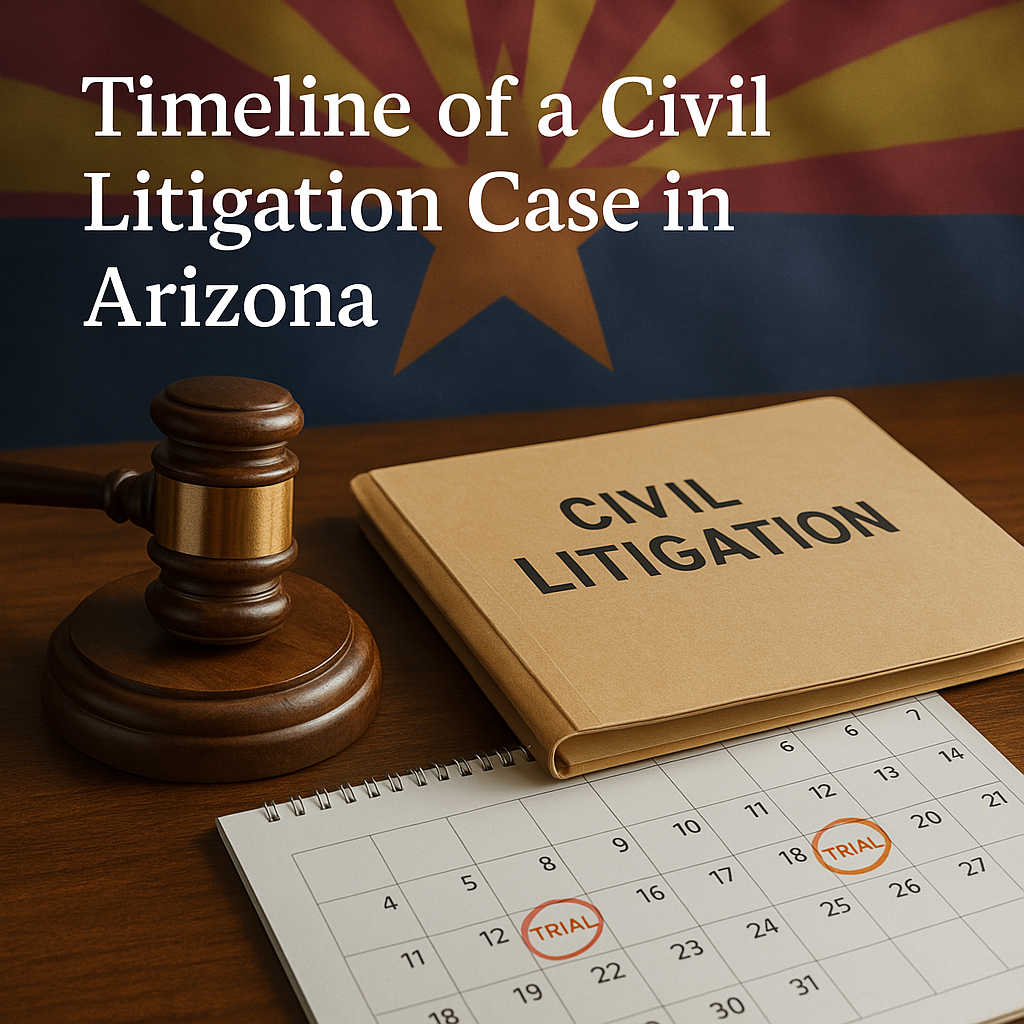
Timeline of a Civil Litigation Case in Arizona: What to Expect from Filing to Trial
If you’re involved in a civil lawsuit in Arizona, whether you’re suing or being sued, understanding the typical timeline can help reduce uncertainty and prepare you for what lies ahead.
At Arizona Legal Advisor, we help individuals and businesses navigate civil litigation efficiently and strategically.
1. Pre-Litigation Stage (Optional but Recommended)
Before filing a lawsuit, many parties engage in pre-litigation efforts to resolve the dispute without going to court. These steps may include:
Investigating the facts and gathering documentation
Sending a formal demand letter outlining the legal claims and proposed resolution
Attempting informal negotiations or mediation
While not required, pre-litigation efforts can often lead to early settlements, saving time, money, and stress. In some cases, they also help clarify the issues and strengthen your position if litigation becomes necessary.
2. Filing the Complaint
The litigation process officially begins when the plaintiff files a Complaint with the appropriate Arizona court:
Superior Court for claims over $10,000
Justice Court for smaller claims
The Complaint outlines the legal claims, the factual basis for the lawsuit, and the relief sought (such as monetary damages or injunctive relief). Filing fees apply and vary by court.
3. Service of Process
The Defendant must be properly served with the Complaint and Summons, typically by:
Process server.
Sheriff’s deputy.
Alternative service.
Publication.
This step is critical—it officially notifies the defendant of the lawsuit and starts the clock for their response.
4. Defendant’s Response
The defendant has a limited time to respond:
20 days if served within Arizona
30 days if served outside Arizona
The response may include:
An Answer admitting or denying the allegations
Counterclaims against the plaintiff
Motions to dismiss or challenge the Complaint on procedural grounds
Motion for more definite statement
Failure to respond can result in a default judgment in favor of the plaintiff.
5. Initial Disclosures and Discovery Phase
After the initial pleadings, both parties must exchange mandatory disclosures under Arizona Rules of Civil Procedure. These include:
Names of witnesses
Relevant documents
Damage calculations
Insurance information
The discovery phase follows, allowing each side to gather evidence through:
Interrogatories (written questions)
Requests for production of documents
Depositions (sworn testimony)
Requests for admissions
Discovery typically lasts 6 to 12 months, depending on the complexity of the case and the level of cooperation between parties.
6. Motions Practice
During or after discovery, parties may file various motions to:
Dismiss claims or defenses
Compel discovery responses
Request Summary Judgment if there are no material facts in dispute
Motions can resolve specific issues or even dispose of the entire case before trial. Courts may hold hearings to decide these motions.
7. Settlement Negotiations and Mediation
At any point in the process, the parties may attempt to settle the case. This can occur through:
Informal negotiations between attorneys
Court-ordered mediation or other Alternative Dispute Resolution (ADR)
In Arizona, many civil cases settle before trial, especially after discovery clarifies the strengths and weaknesses of each side’s case.
8. Trial Preparation
If the case does not settle, both sides begin preparing for trial. This includes:
Finalizing witness and exhibit lists
Filing pretrial statements and motions
Attending pretrial conferences with the judge
The court will set a trial date, often 12 to 18 months after the Complaint was filed. Complex cases may take longer.
9. Trial
At trial:
A judge or jury hears the evidence
Each side presents witnesses, documents, and legal arguments
The fact-finder determines liability and, if applicable, awards damages
Trials can last from a single day to several weeks, depending on the number of issues and witnesses involved.
10. Post-Trial Motions and Appeals
After trial, either party may file:
Motions for reconsideration or a new trial
An appeal to the Arizona Court of Appeals
Appeals can extend the case timeline by several months or even years, depending on the complexity of the legal issues involved.
Typical Civil Case Timelines in Arizona
Case Type | Estimated Timeline |
|---|---|
Simple, uncontested cases | 6 to 12 months |
Contested, moderate cases | 12 to 18 months |
Complex, high-stakes cases | 18 months to several years |
Conclusion: Civil Litigation Takes Time - Be Strategic
Civil litigation in Arizona is a structured process with multiple stages, each requiring careful attention and legal strategy. While the process can be lengthy, experienced legal counsel can help you:
Understand your rights and obligations
Avoid costly procedural mistakes
Maximize your chances of a favorable outcome
Facing a Civil Lawsuit in Arizona?
At Arizona Legal Advisor, we provide practical, strategic representation for individuals and businesses in all stages of civil litigation.
Schedule a consultation today to protect your interests and move forward with confidence.
